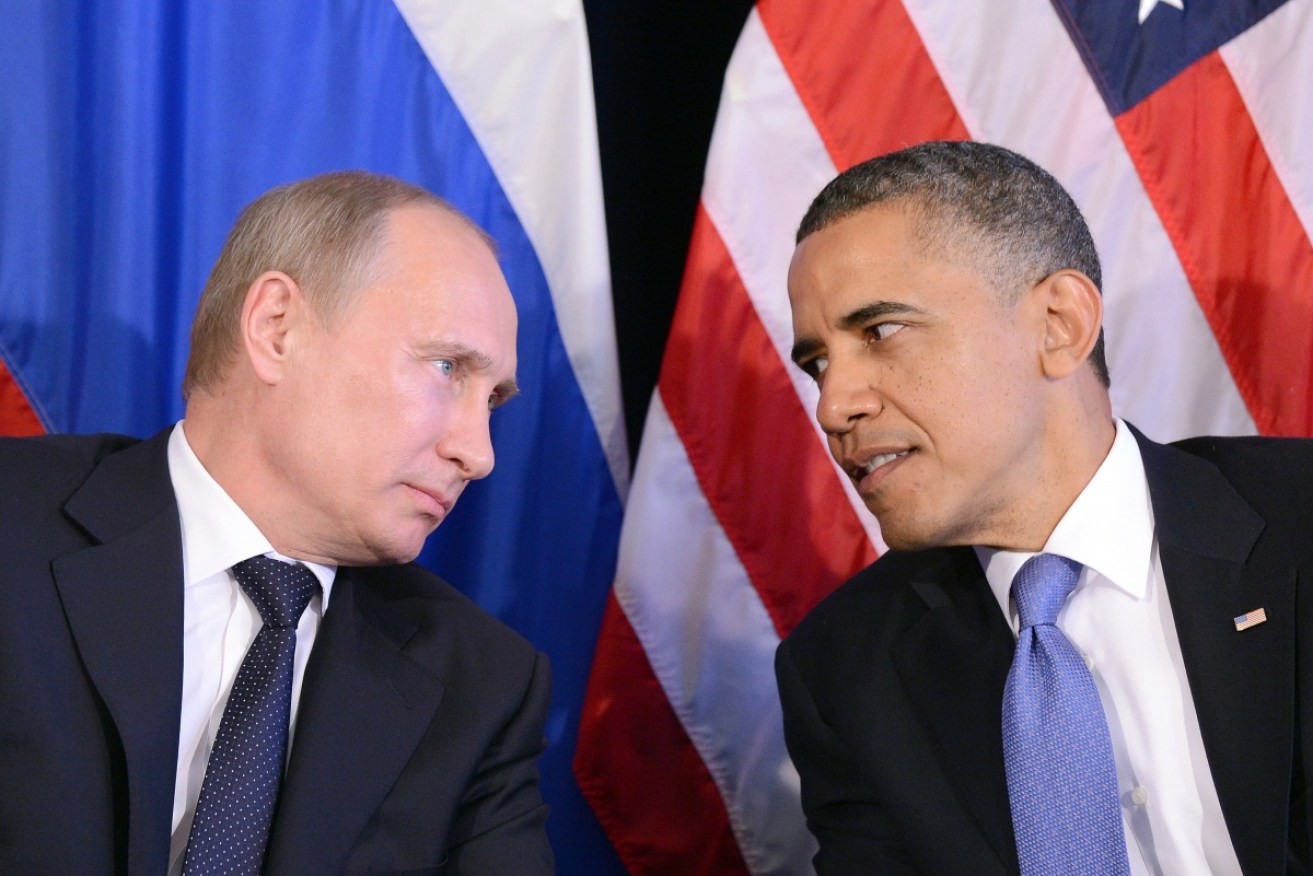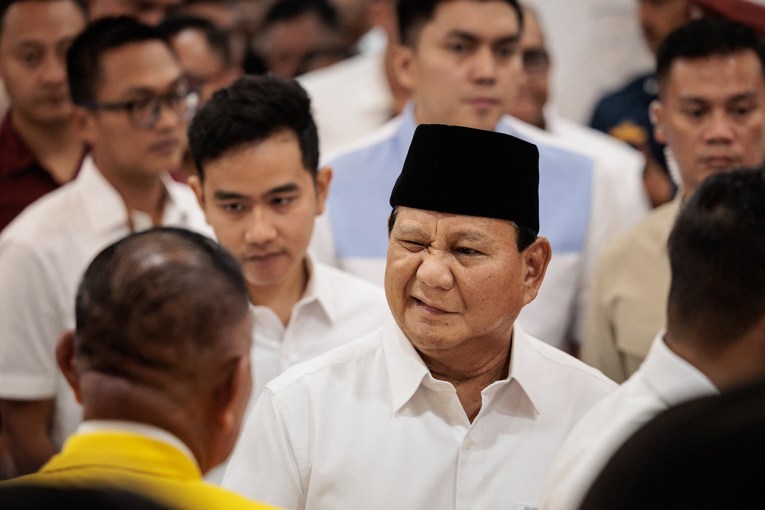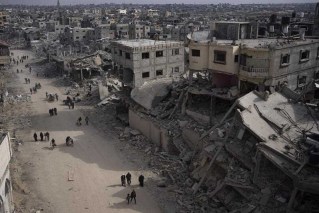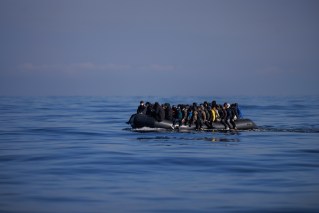Putin delays reprisals for USA’s ‘biggest retaliatory move’ since Cold War


Barack Obama's decision to impose new sanctions on Russia drew an immediate response from Kremlin officials. Photo: Getty
Russian President Vladimir Putin has surprised many by refusing to retaliate after US President Barack Obama announced a raft of sanctions against Moscow in response to alleged hacking during the US election.
On Friday night (AEDT), Russian Foreign Minister Sergey Lavrov recommended that President Vladimir Putin move to expel 35 US diplomats and ban its officials from using properties in Moscow, according to The New York Times.
It came after President Obama said the US would impose measures dubbed the “biggest retaliatory move” since the Cold War by experts.
That included expelling 35 diplomats, closing two Russian compounds and placing sanctions on Russian intelligence agencies.
Mr Putin posted a statement on the Kremlin website saying that Russia “would not create any problems for American diplomats. We will not expel anyone”.
A statement on the Kremlin’s website read: “[Russia] will not resort to irresponsible ‘kitchen’ diplomacy but will plan our further steps to restore Russian-US relations based on the policies of the Trump Administration.”
Incoming president Donald Trump praised Mr Putin on Twitter for delaying reprisals, writing, “I always knew he was very smart”.
Great move on delay (by V. Putin) – I always knew he was very smart!
— Donald J. Trump (@realDonaldTrump) December 30, 2016
But elsewhere the Russian response on Friday was swift and at times unusual, with its embassy in London posting a photo of a “lame duck”, presumably in reference to the outgoing president.
President Obama expels 35 🇷🇺 diplomats in Cold War deja vu. As everybody, incl 🇺🇸 people, will be glad to see the last of this hapless Adm. pic.twitter.com/mleqA16H8D
— Russian Embassy, UK (@RussianEmbassy) December 29, 2016
Kremlin spokesman Dmitry Peskov accused the US of wanting to “destroy US-Russia relations”, and signalled Mr Obama’s “unpredictable” and “aggressive foreign policy.”.
Mr Peskov said Russia would “react in an adequate manner based on the principles of reciprocity”.
“We categorically reject the unfounded assertions and accusations made about Russia,” he told the Ria-Novosti news agency.
Prime Minister Dmitry Medvedev took to Twitter, saying the Obama administration was “ending its term in an anti-Russia agony”.
Konstantin Kosachyov, the head of the foreign affairs committee in the upper house of the Russian Parliament, told Interfax that “this is the agony not even of ‘lame ducks,’ but of ‘political corpses’.”
It is regrettable that the Obama administration, which started out by restoring our ties, is ending its term in an anti-Russia agony. RIP
— Dmitry Medvedev (@MedvedevRussiaE) December 30, 2016
Obama strikes back
The US sanctions were imposed in response to allegations of Russian hacking during the US election campaign. US intelligence agencies, including the FBI and CIA, concluded that the aim of the hack was to cause damage to Democrats candidate Hillary Clinton and to favour Republican candidate Donald Trump.
“These actions follow repeated private and public warnings that we have issued to the Russian government, and are a necessary and appropriate response to efforts to harm US interests in violation of established international norms of behaviour,” President Obama said on Friday.
He accused Russia’s military intelligence agency, the GRU, of conducting the hacking, and also imposed sanctions on four GRU officials, two separate individuals and three companies.

Mr Obama had foreshadowed actions over the alleged hacking after the election. Photo: AP
Mr Lavrov spoke of possible reprisals, including closing a swimming and boating area and a warehouse used by US diplomats.
The removal of a “commensurate number” of officials in response was common in diplomacy, said Professor Felix Patrikeeff, an International Relations expert from the University of Adelaide.
Professor Patrikeeff told The New Daily he agreed Mr Obama’s actions had represented “the biggest retaliatory move” since the Cold War.
Analysts, as well as aides for President-elect Donald Trump, have also speculated that the latest sanctions were an attempt to “box in” Mr Trump.
“That would be very unfortunate if politics were the motivating factor here,” top Trump aide Kellyanne Conway told CNN.
“We can’t help but think that’s often true.”
Professor Felix Patrikeeff said the sanctions could prove to be a “poison apple” for Mr Trump, who has indicated he wants to pursue a more conciliatory relationship with Moscow.
The Trump era
Alexey Muraviev, a Russian strategic affairs expert at Curtin University, said Russia would expect relations to improve when Mr Trump took office and looked to his presidency with “cautious optimism”.
“The Russians look at Obama as someone on the way out,” he said.
“They look at him with no respect, as a weak president.”
Dr Muraviev said the response of Russia’s UK embassy should be seen in the context of Mr Obama also breaking diplomatic protocols, saying the President had revealed details of confidential discussions he had held with Mr Putin.

Mr Trump dismissed concerns over Russian hacking during an impromptu press conference with boxing promoter Don King. Photo: AP
On Friday, Mr Trump issued a statement, reiterating his belief that “it is time for our country to move on to bigger and better things”.
But he said he would meet with leaders of the intelligence community to discuss the issue.
Mr Trump’s position on Russia is at odds with senior figures in the Republican Party, including former 2008 presidential nominee John McCain and party elder Senator Lindsey Graham.
The pair welcomed the sanctions on Friday while suggesting they would lead a congressional push for tougher measures.
“But ultimately, they are a small price for Russia to pay for its brazen attack on American democracy,” Senator McCain said.
Dr Muraviev said a tougher response could include directing military aid to Ukraine and an escalation of US military activities near the Russian border.








